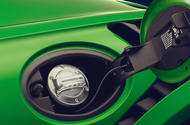Most companies are rushing towards electric cars, but Mercedes, Porsche and Geely are looking at alternatives
What with the current government announcing that internal combustion engines will be banned from sale in a decade and the huge sums being sunk into EV development by Europe’s biggest carmakers, you’d be forgiven for thinking the argument has been won by battery power.
I think not. The massive increase of extraction rates, both of rare earth minerals and commodities such as copper, will become a serious – possibly insurmountable – issue for mass electric vehicle adoption. And the shift to ‘net-zero’ for power generation will also mean that, unlike today, road transport will be fighting for the same power supply as households and industry.
Battery cost, according to a report released yesterday, may flatline at $100/kWh and even rise on increasing commodity cost. Plus, some of the most bullish forecasters think EVs will only account for 31% of global sales by 2030.
We really need another ‘net-zero’ power source for global automobility.
But don’t take my word for it. Ask Daimler (owner of Mercedes) and Chinese company Geely (owner of Volvo). Or ask Porsche and German engineering giant Siemens.
A recent leak in the German newspaper Handelsblatt revealed that Mercedes-Benz was teaming up with Geely to develop a new family of petrol engines, which will be manufactured from 2024 onwards. Surprising, when some have claimed European carmakers are winding down ICE development work.
But much more interesting is Handelsblatt’s claim that these ICE engines will be able to run on both Hydrogen gas and ‘efuels’. The former isn’t science fiction at all. BMW’s Valvetronic petrol engines could burn Hydrogen as a fuel with relatively little modification. Indeed, over a decade ago, I drove a 7-series demonstrator on the much-missed Future Car Run from Brighton to London.
Efuels, though you’d be forgiven for not knowing it, are also a chemical reality. In the 2000s, Audi created ‘e-diesel’ in plastic, using genetically modified organisms and water tubes laid out in desert conditions, using the sun’s energy to make artificial diesel.
Audi has also been working with universities, using a North Sea wind turbine to ‘crack’ Hydrogen from seawater and combine it with CO2 to make synthetic methane.
So far, so experimental? Well, last week Porsche and Siemens unveiled plans for mass production of efuels, using wind power in Southern Chile. After cracking hydrogen from seawater, the gas will be combined with CO2 extracted from the atmosphere to create synthetic methanol.
Motor sport fans will remember that methanol was used in US motorsport and even available in production cars in California.
What’s interesting is the speed of ramping at the Porsche/Siemens project. 130,000 litres will be made by 2022, 55 million litres by 2024 and 560 million litres by 2025. Porsche’s plan is to use “eFuels in vehicles for Porsche motorsports, at the Porsche Experience Centers and prospectively also in serial production sports cars”, powering both combustion engines and plug-in hybrids.
It’s not too fanciful to imagine a future hypercar designed to run on Porsche eFuel, fuelled at the local Porsche dealer, or by home-delivery bowser. Perhaps green methanol will save the 911?
Mercedes, Porsche and Geely clearly have faith in fuels made from intermittent wind power. When you also factor in the huge geopolitical advantages of countries such as Chile and Morocco – blessed with strong winds and open space – becoming massive production hubs for cheaply storable efuels, there are clearly environmental, economic and engineering reasons behind this plan.
So, by 2030 where will we be? I suspect efuels will be gaining serious traction. The 70% of new vehicles that aren’t EVs could well be 45% efuel and 25% hydrogen.
Remarkably, as I was writing this piece an academic contact got in touch to say he was moving to a university in the Middle East because Saudi Arabia is poised to heavily invest in eFuel production.
I feel that reports of the death of the ICE are being greatly exaggerated.
READ MORE
Porsche announces partners for Haru Oni e-fuels project
Mercedes R&D boss: synthetic fuel not a viable option
EU oil refineries back synthetic fuels for climate-neutral future
Source: Autocar
